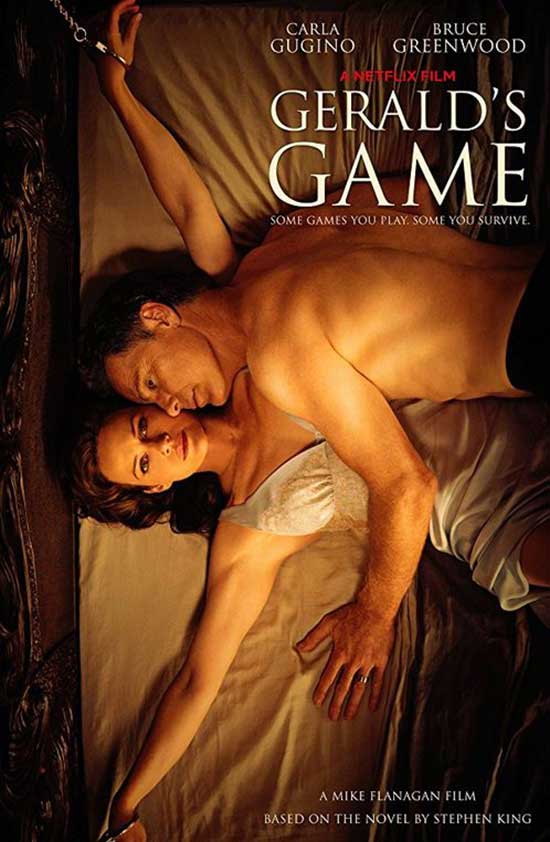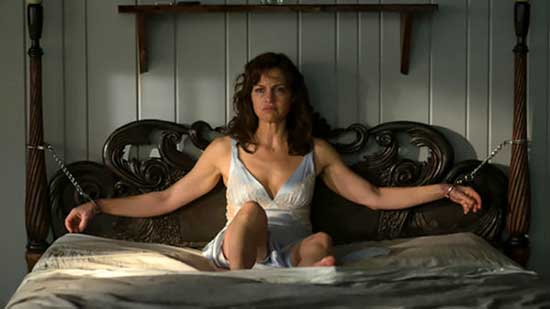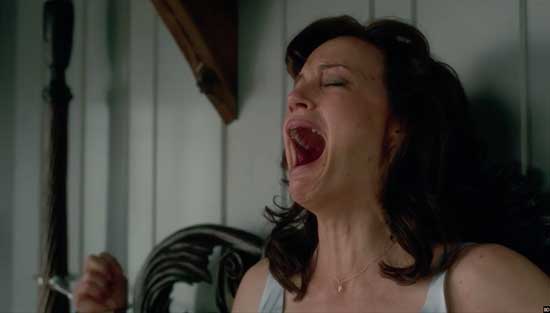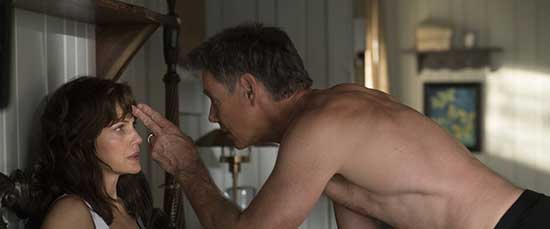SYNOPSIS:
While trying to spice up and ultimately save their marriage with a trip to their remote lake house, Jessie must fight to survive when her husband dies unexpectedly leaving her handcuffed to the bed frame.
REVIEW:
Director: Mike Flanagan
Writer: Stephen King, Mike Flanagan, Jeff Howard
Starring: Carla Gugino, Bruce Greenwood
If you’ve read Stephen King’s 1992 suspense novel, Gerald’s Game, then you are well aware that a film adaptation is not a simple task. Many thought it would never be done because of the premise alone and hell, a lot of people (Constant Readers included) avoided reading the novel all together because of the assumption that a woman handcuffed to a bed the entire time couldn’t have much of a plot. Well, I’m here to tell you that Director Mike Flanagan proved us all wrong.
With such films as Occulus and Hush under his belt, Flanagan has continuously contributed worthwhile and compelling subject matter on screen in a unique fashion. His use of framing, symbolism, and creative storytelling has enabled him to produce repeatedly powerful films since his directorial debut with Absentia in 2011. A fan of Stephen King himself, Flanagan stated at Fantastic Fest this year that he literally carried around the book Gerald’s Game since he was in college and executing the story on camera was his ultimate passion project.
The story is simple enough. Jessie (Carla Gugino) is dissatisfied with her marriage and in effort to restore their passion for one another, her and her husband Gerald (Bruce Greenwood) retreat to their secluded cabin in Maine for a weekend of kink. Within the first scenes, foreshadowing is evident as they encounter a stray dog devouring roadkill in their path. Upon arrival, Gerald swallows his trusty little blue pill in preparation. As he handcuffs Jessie to the bed, there’s immediate regret and panic in her eyes. While trying to talk through her discomfort, Gerald becomes increasingly frustrated and eventually suffers a heart attack and collapses. After kicking his lifeless body to the ground, dread and panic sink in as no one is able to hear her screams of terror and desperation.
In the book, this is Gerald’s last stop. However in the film, Flanagan wisely chose to display Jessie’s slow descent into madness through Gerald’s continued communication despite being blatantly dead. With nightfall approaching, we are reintroduced to the dog as he feasts on Gerald’s corpse causing the audience to literally gasp in disgust. This trauma leads Jessie to continue sinking further into her subconscious and begins revisiting old memories of abuse from her father but gathers strength from visualizing herself consulting her through this debilitating ordeal. This is where Flanagan truly shines. If you’ve seen Hush (if you haven’t, add it to your list immediately), you should be able to recall Maddie’s thought process when she plays out scenarios in her head on how to escape. This scene sparked my confidence in Flanagan and his ability to execute internal dialogue on camera. While the scene differs to how it is applied in Gerald’s Game, both work flawlessly while keeping the emotional narrative and character arc.
At night, a third character presents itself by lingering in the shadows while Jessie sleeps. Considered Death personified, this creature slowly approaches her bedside and displays a skin bound suitcase filled with bones and jewelry collected from his previous victims. Unable to accept her fatal faith, Jessie surfaces childhood memories to inspire her escape and literally slip through Death’s grip. While this film contains a fairly minimal amount of gore, there is one scene that will scar your retinas. While the audience was again gasping and squealing in repulsion, I glanced back two rows to check out Mike Flanagan’s facial expression and let me tell you, that guy had the biggest grin while chuckling at everyone’s reaction.
The voice-over dialogue at the end of the film is a questionable choice to some. However, it does align with the novel. In a year where King adaptations are running rampant, this is a mild complaint within an overall film. While other adaptations in the past have fallen short (ahem Dreamcatcher), Gerald’s Game shines. It’s also worth noting that Flanagan, like King, hides Easter eggs in his films. The bed frame is actually the mirror from Occulus and the book that Jessie throws at the dog while he licks up Gerald’s spilled blood is Midnight Mass, the book Maddie is writing in Hush. Little directorial touches like this make the film all that more enjoyable and further pays homage to the King himself.
Gerald’s Game is ultimately a story of empowerment and facing your demons while working through trauma. Despite being chained to a bed, it is a story about hope and loving one’s self while emancipating your life from turmoil and anguish. While we are living in an age where women are repeatedly objectified and harassed, this film surfaces as a breath of fresh air. Combining strength and resiliency alongside gruesome imagery, Flanagan releases a relevant film to the times and pays homage to a lesser known literary gem in the most satisfactory manner. And for all of that, I thank him.
Gerald’s Game hits Netflix on September 29, 2017.
 Horror News | HNN Official Site | Horror Movies,Trailers, Reviews
Horror News | HNN Official Site | Horror Movies,Trailers, Reviews











